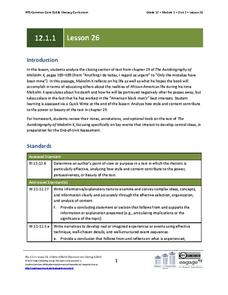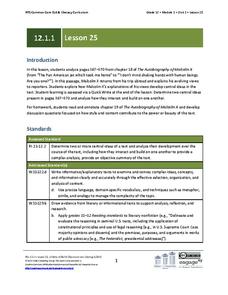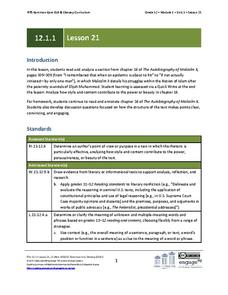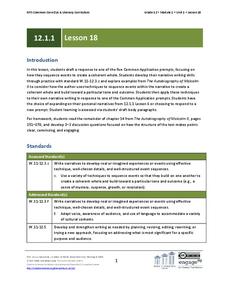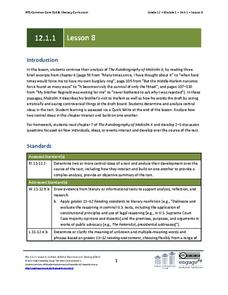California Department of Education
Matching Interests and Careers Distance Learning Online Activity
Using the California CareerZone Interest Profiler results, scholars choose an occupation to research then write a summary about what they discovered.
California Department of Education
What’s Next?
A richly detailed, step-by-step plan is designed to help high school seniors create a postsecondary plan for pursuing their career goals. Using the template provided by the California Career Center website, individuals complete their...
K20 LEARN
Ichabod and Brom - Ghostfacers: Credibility and The Legend Of Sleepy Hollow
A headless horseman? Really? A reading of "The Legend of Sleepy Hollow" launches a study of how to use the A-CLAP strategy to determine a story's credibility. Writers employ these techniques to craft their ghost stories and make them...
Anti-Defamation League
"What is it Like to be an Outsider?”: Building Empathy for the Experiences of Immigrants
This lesson highlights the struggles of immigrants and the importance of showing empathy. Beginning with a read-aloud of a book in another language and a poem, scholars take part in a thoughtful discussion. Then, the class examines a...
EngageNY
Grade 12 ELA Module 1, Unit 2, Lesson 5
As class members conclude their reading of Leslie Marmon Silko's "Yellow Woman and a Beauty of the Spirit," they consider how the story of Kochininako, Yellow Woman, not only provides a satisfying ending to the narrative but also...
EngageNY
Grade 12 ELA Module 1: Unit 1, Lesson 28
After discussing Haley's techniques in his conclusion of The Autobiography of Malcolm X, class time is devoted to drafting, sharing, and getting feedback on writers' college essays.
EngageNY
Grade 12 ELA Module 1, Unit 2, Lesson 2
As part of their reading of Leslie Marmon Silko's "Yellow Woman and a Beauty of the Spirit," class members analyze how the author develops her narrative through dialogue, description, and multiple plot lines.
EngageNY
Grade 12 ELA Module 1, Unit 2, Lesson 3
How does an author sequence events in a narrative so that the events build on one another and create a tone of mystery, growth, or resolution? As part of a study of narrative writing, class members work in pairs to examine the techniques...
EngageNY
Grade 12 ELA Module 1, Unit 2, Lesson 4
The fourth instructional activity in this narrative writing unit focuses on how Leslie Marmon Silko uses telling details and sensory language in her "Yellow Woman and a Beauty of the Spirit" to bring alive the people of Laguna Pueblo and...
EngageNY
Grade 12 ELA Module 1: Unit 1, Lesson 26
Readers use their annotations and questions about chapter 19 of The Autobiography of Malcolm X to guide their discussion of the final chapter of the text.
EngageNY
Grade 12 ELA Module 1: Unit 1, Lesson 25
Class members return to the discussion of The Autobiography of Malcolm X using the questions they developed and their annotated notes of the events in chapter 17.
EngageNY
Grade 12 ELA Module 1: Unit 1, Lesson 23
Malcolm X's journey to Cairo, his Hajj, his Letter from Mecca detailing his insights into "true Islam," and his transition to Al-Hajj Malik El-Shabazz are the focus of the discussion of chapter 17 of The Autobiography of Malcolm X.
EngageNY
Grade 12 ELA Module 1: Unit 1, Lesson 24
Today's discussion of The Autobiography of Malcolm X focuses on the precise words, the telling phrases, and the sensory details Haley uses to enliven his story. Writers then work to incorporate these same techniques in the draft of their...
EngageNY
Grade 12 ELA Module 1: Unit 1, Lesson 19
Class members return to a discussion of The Autobiography of Malcolm X, discussing how Haley foreshadows the growing distrust and downturns in the influence of the Nation of Islam.
EngageNY
Grade 12 ELA Module 1: Unit 1, Lesson 21
". . .the chickens have come home to roost." Chapter 16 of The Autobiography of Malcolm X is the focus of this lesson plan. Readers use their worksheets to record evidence of character development and Haley's stylistic choices that...
EngageNY
Grade 12 ELA Module 1: Unit 1, Lesson 17
Integration versus separation. Readers of chapter 14 of The Autobiography of Malcolm X examine Malcolm X's views on other Civil Rights leaders and their integration ideas. Class members also return to the narrative essay strand of the...
EngageNY
Grade 12 ELA Module 1: Unit 1, Lesson 18
Class members take a break from discussing The Autobiography of Malcolm X to focus on their personal narrative essays. Before working on their drafts, they review what they have learned from their study of Haley's narrative about...
EngageNY
Grade 12 ELA Module 1: Unit 1, Lesson 9
As they read and discuss Chapter 7 of The Autobiography of Malcolm X, class members continue to use the Tracking Tool worksheet to record evidence on how the central ideas are being developed.
EngageNY
Grade 12 ELA Module 1: Unit 1, Lesson 10
Readers examine the rhetorical devices Haley uses in chapter 8 of The Autobiography of Malcolm X, paying particular attention to the diction and syntax and how these choices reveal changes in Malcolm X's point of view.
EngageNY
Grade 12 ELA Module 1: Unit 1, Lesson 13
Readers of The Autobiography of Malcolm X continue their analysis of the methods Haley uses to show how Malcolm X is changing due to his exposure to the teachings of Elijah Muhammad.
EngageNY
Grade 12 ELA Module 1: Unit 1, Lesson 7
Readers of The Autobiography of Malcolm X examine how Haley's word choice and point of view in chapter 5 reveal Malcolm X's attitude toward his behavior as he travels from Lansing to Harlem.
EngageNY
Grade 12 ELA Module 1: Unit 1, Lesson 6
To prepare for drafting their Common Application narrative, class members return to the opening pages of The Autobiography of Malcolm X and examine how Haley engages and orients readers, establishes his narrator and point of view, and...
EngageNY
Grade 12 ELA Module 1: Unit 1, Lesson 8
Readers use the provided worksheet to analyze the narrative techniques Haley uses in chapter 6 of The Autobiography of Malcolm X to continue the development of the central ideas of racial identity and systemic oppression.
EngageNY
Volume of Right Prisms
Apply volume and area formulas to find the volume of any right prism. The 26th lesson of a 29-part module examines methods for finding the volume of right prisms with varying shapes of bases. Learners use the formula V = Bh to find...
Other popular searches
- Homework Help
- Homework Help and Study Guides
- Creative Writing Homework
- Ratio Tables Homework Help
- Homework Help History
- Health Homework Help
- Reading Homework
- Math Homework
- Math Homework Help
- Homework Help Lessons
- Homework Log
- Reading Homework Packets









